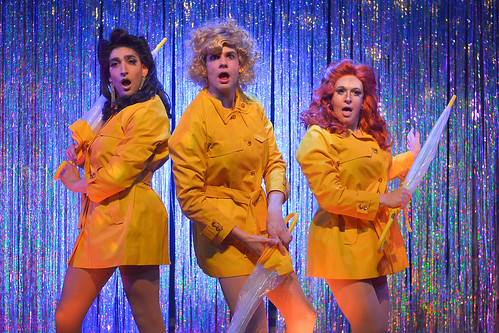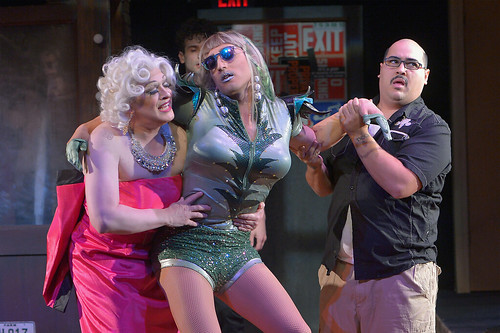EXTENDED THROUGH JULY 9

The cast of Mathew Lopez’s The Legend of Georgia McBride at Marin Theatre Company includes (from left) Jason Kapoor as Rexy, Adam Magill as Casey and Kraig Swartz as Miss Tracy Mills. Below: Backstage drama comes to Miss Tracy Mills (Swartz, left), Rexy (Kapoor, center) and Eddie (John R. Lewis). Photos by Kevin Berne
When you’re already an Elvis impersonator, could drag really be that far behind? Not according to the glittery, big-hearted drag comedy The Legend of Georgia McBride now closing the 50th anniversary season at Marin Theatre Company. Playwright Matthew Lopez dips into territory previously covered by The Adventures of Priscilla, Queen of the Desert, To Wong Foo, Thanks for Everything, Julie Newmar, Kinky Boots, Tootsie, Sordid Lives and Some Like It Hot, and while there are certain formulaic aspects of the story of a straight man embracing his inner drag diva, it’s all done with such sincerity and good humor it’s impossible to resist.
One question Lopez doesn’t really answer in his script is why Casey (Adam Magill) is so invested in being an Elvis impersonator at a rundown club in Panama City, Fla. He had done some musicals in high school, but now that he’s a married adult, his choice of profession is swiveling his hips and lip-synching to Elvis songs for about seven indifferent people in the audience. His wife, Jo (Tatiana Wechsler) is living the cranky life as a waitress and serves as the family’s bread winner. During a fight involving a bounced rent check, the loss of the Elvis gig and impending eviction, Jo announces she’s pregnant.
Even though he can’t don his rhinestone jumpsuit (complete with cape!), Casey returns to the bar to serve as bartender, but wouldn’t you just know? The drag duo the bar’s owner, Eddie (John R. Lewis), hired to drum up some audience interest has hit a snag: one of the performers, Miss Rexy (Jason Kapoor) has passed out cold. So in true show-biz fashion, the older, wiser drag queen, Miss Tracy Mills (Kraig Swartz) whips Casey into a wig, a dress, heels and makeup and forces him onto the stage. Somehow, the number works in spite of Casey’s awkwardness and the fact that the Piaf song he was saddled with was in French (just mouth the words “watermelon motherfucker” is the advice he’s given, and it sort of works). A drag star is born.
Casey doesn’t exactly tell Jo why they can suddenly pay the rent, so of course that will catch up with him. But apart from the requisite drama, the fun in director Kent Gash’s production comes from some delightful drag performances featuring a parade of beguiling outfits designed by Kate Harmon. Swartz has real panache – his Garland and Streisand bits are priceless – and the ever-appealing Magill oozes sincerity and sensitivity and makes his drag persona, Georgia McBride, really shine when his performances are more organic and less choreographed. Kapoor, who does double duty as Casey’s friend/landlord, also has an impressive Lady Gaga moment of his own. I’m not sure we needed another drag performance of the Weather Girls’ “It’s Raining Men,” but the choreography by Dell Howlett is awfully fun.
As you might expect from such a likable play, this is an extremely likable cast, and it’s especially nice to feel such warmth between Casey and the women in his life: his wife, to whom he gives foot rubs and his eternal devotion, and Miss Tracy, the mentor who will actually make him a better man (i.e. an adult who can see more clearly who he is and what he wants). As Miss Tracy puts it, Casey is a straight man in drag and she’s a drag queen in hell. Lopez gets off some nice zingers, and there’s a sustained sense of laughter and good cheer through much of the show’s intermissionless 115 minutes. We get an unnecessary lecture about what drag really means, and the play doesn’t know quite how (or when) to end, but as long as Swartz’s in-charge Miss Tracy is actually in charge, it’s all good.
Drag is complicated, especially in terms of its relationship to gender, sexuality and good old-fashioned camp. Georgia McBride isn’t the play that’s going to delve into and unpack or illuminate all of that. But it is a rousing good time with a zippy soundtrack, Florida panhandle glitz and endearing, open-hearted characters.
FOR MORE INFORMATION
Matthew Lopez’s The Legend of Georgia McBride continues an extended run through July 9 at Marin Theatre Company, 397 Miller Ave., Mill Valley. Tickets start at $22. Call 415-388-5208 or visit marintheatre.org.




